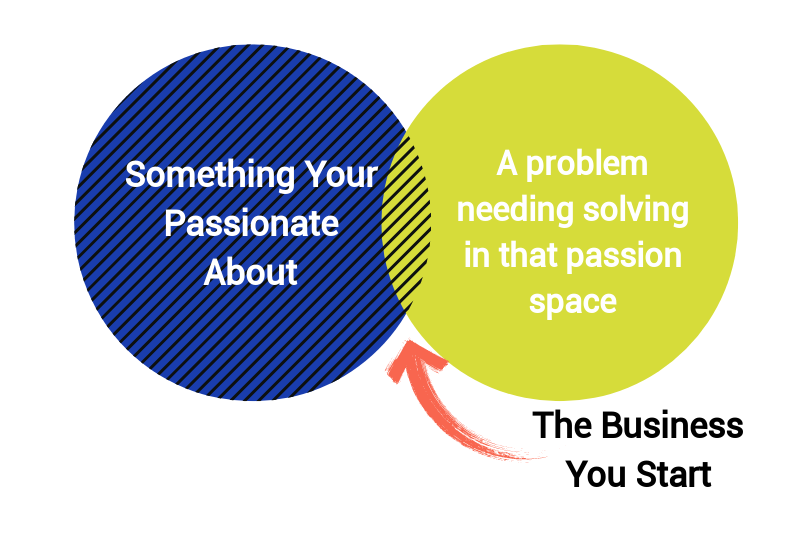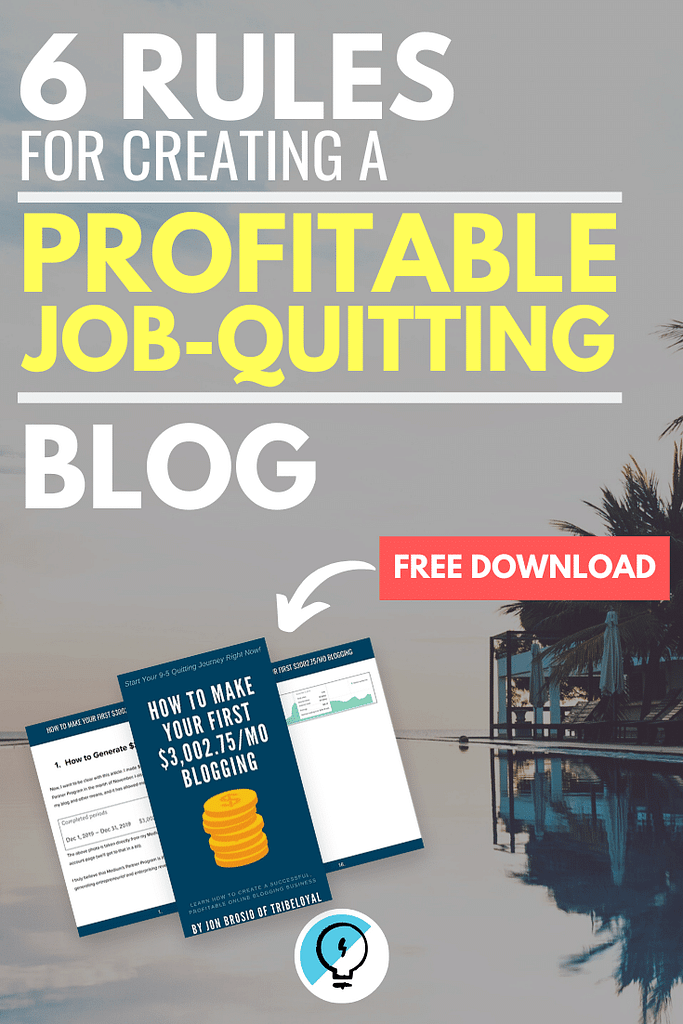Today’s economic landscape has lowered the barriers to becoming an online entrepreneur.
In recent decades, it took a lot of resources, oversight, and manpower in order to go into business for yourself. Going into business for yourself has many motivations associated with it:
- You can work your own hours
- Depending on the work output and value provided, you can generally make more than a standard salary
- You have the freedom to choose where you conduct your business
- You don’t have to be beholden to anyone except your customer base and audience
All of the above-mentioned motivations (and others not mentioned) are enough to energize anyone into going into business for themselves.
Of course, many people don’t take this route.
Why?
Many people believe that the entrepreneurial route takes on too much risk. People think that they cannot take on the business loans required. People think they need a consistent income now for the current life they’ve built. People believe that their ideas aren’t “good enough.”
The list goes on and on with excuses why one shouldn’t become entrepreneurial.
But that’s the thing, isn’t it? All of the aforementioned excuses are just that — excuses.
When you begin to peel back the layers, you can start to see that in today’s economic landscape, the time has never been better for becoming an entrepreneur — more specifically, an online blogging entrepreneur.
Unless you’ve been living under a rock, you are familiar with blogs.
You may not, however, be familiar with the advantages of owning and building a blog for yourself.
Let’s reverse engineer some of the statistics that we currently know about blogging: there are roughly 152 million blogs currently on the internet. Within that population, about 31% of those bloggers actually return a profit from their endeavors. Now that might feel discouraging to many reading this. However, let’s take a look at what 31% of 152 million actually is:
- 47,120,000
That’s almost 50M people who are going to turn a profit from their blogging efforts.
Furthermore, research indicates that only 2% of bloggers actually generate an income of at least $150,000 annually. Again, you might feel like tossing in the towel straight from the get-go after reading that, but let’s dive in further.
That’s still 3.04M people that are going to generate a 6-figure income from their blogging efforts.
Call me crazy, but you should like your chances of being one of those 3M people!
In this article, we’re going to go over the six rules one needs to adhere to in order to build an enterprising and day job quitting blog starting right now.
Rule 1: Show Up (Even on the Days You Don’t Want To)
“You might well remember that nothing can bring you success but yourself.”
— Napoleon Hill
There is no way you’re going to be able to do something great unless you show up every day to do the work needed.
Millions of people want to become their “own boss.” As we saw earlier, only a small percentage of people are actually going to achieve that.
Why?
Well, because most people will give up in the beginning stages of the pursuit. I’ve been blogging full time for four years now.
I’ve met a lot of people.
Most of those people are nowhere to be found on the web any longer. And I get why. It’s extremely exciting to start a new endeavor. Things are new. When you begin starting something new, you feel as if you make measurable progress every time you practice the craft:
- Starting out, it’s easy to learn introductory chords of a guitar
- In the beginning, you see and feel muscle growth with working out
- During the onset, you may receive a few hundred views on your content
And then like most things, these results begin to plateau. The plateau is generally when the vast majority of people practicing a new craft give up.
The results begin to fizzle out and most people working towards building that new skill, business, or endeavor give up.
- There are going to be days in which you don’t want to work on your blog — you have to.
- There are going to be days in which it seems you aren’t generating any new traffic — keep posting content.
- There are going to be days you don’t get any new email subscribers — keep engaging with your current ones.
Show up every day, even if it is to add just 1% more to what you already have. The Great Pyramids of Giza were built one brick at a time.
Rule 2: Solve a Problem for Your Audience
“Don’t find customers for your products, find products for your customers.”
— Seth Godin
All too often, people get into the online business and blogging world because they have a voice and think that it’s so special that people, flocking in the tens of thousands, will gather to heed the information that will cascade through the typing of your keyboard.
Unfortunately for people with that mindset, this couldn’t be farther from the truth.
If you’re entering into the blogging space because you want a therapeutic space where you can share your thoughts and get new ideas into the world — c’est la vie. I’m not going to stop you.
However, if you’re entering into this space because you’re tired of working at your miserable job, working for people you don’t respect and making an income worth less than what you know you’re capable of — then listen up.
The surest way you can convert your blog into an online business is first through viewing this blog as a product or service that solves the reader’s/audience’s problems.

You can see in the above diagram that you can still blend something that you’re passionate about in order to build the longevity of this endeavor.
It’s going to be hard to write about ways to minimize debt in your life if you’ve never had to deal with that (and you have ZERO interest in the finance space).
Blend what you are passionate about first and think about what problems within that space/niche you can help your readers remedy.
Rule 3: Collect Email Addresses
“Email has an ability many channels don’t: creating valuable, personal touches — at scale.”
— David Newman
The backbone of any successful online business or blog is your email list.
Think about it for a second.
We think that email doesn’t provide immediate value from the perspective of the business owner. Many people entering the blogging space look to the newer marketing channels to contribute to their success:
- Social media
- Direct messaging
- SMS marketing
And believe they can put their email marketing efforts aside for the new flashy toy.
In the interim, some of these newer technologies might work. Depending on your target market and niche, you may see a positive ROI in utilizing these efforts.
However, did you know the number of email users in 2019 peaked at 3.93 billion, according to Statista, and that it is expected to grow to 4.3 billion by 2023?
That’s more than half the population of the Earth! I’m not even going to illustrate how the other means of digital marketing compare in terms of numbers.
That might seem all fine and dandy to you.
But you’re here to read about the money!
Well let’s uncover the ROI one can experience with email marketing:
According to the Data & Marketing Association in their 2019 Email Marketer Tracker study, they concluded that for every $1 spent on email marketing, you can expect an average return of $42.
An email list is your direct line of communication for you and your audience. Without one, you cannot guarantee that you’ll be able to communicate with a reader a second time after they’ve been to your site.
Most site traffic is from first time users. According to a survey from Compendium, nearly two-thirds (63%) of businesses that publish a blog say first-time visitors account for more than 80% of the traffic to their blogs.
It’s important that you can provide a visitor with an incentive to join your list so you can remain in contact with them over the months and years.
Rule 4: Syndicate & Market Your Content Across Other Platforms
With my first product that I took to market, I illustrated how I utilized various tools on the internet to take my blog from inception and garnering over 2.5 million views of my content in a matter of three months.
In one of the modules of the product, in order to illustrate traffic generation, I use “fishing” as a metaphor.
Most people, when starting out in the blogging world believe that
“If you build it, they will come”
This is like fishing with a raft in the world-wide ocean. You have a tiny and slow vessel with not too many tools at your disposal, and you have to navigate an enormous landscape in order to find the fish you’re looking for.
Too many people think that just because the site goes live and they’re creating content, people will automatically find the content and site and they’ll be on their way to blogging dominance within their space.
Of course, this is far from the truth.
No one will find the site.
There are simply too many competing sites on the internet, many of which investing hundreds of thousands of dollars monthly on SEO and other digital marketing utilities to beat you out in a Google search.
According to Statista, there are projected to be 31.7M bloggers by the end of 2020 in the United States alone.
Just because you built your site, doesn’t mean you’ll attract the right attention of the people looking for your valuable content — even if you have the greatest content in the world.
An optimal strategy is needed in order to capture the right traffic.
You need to syndicate your content on the right sites. The sites include (but are not limited to):
- Medium
- Quora
Now each of these sites has their specific advantage as to why you should syndicate content and they all coalesce into garnering the right traffic with the right viewership.
Quora
Quora allows you to find questions that populations are asking. Your goal here is to answer the questions in article format to help supplant you and your brand as the go-to source for the solution. The questions act as writing prompts as well if you are having trouble coming up with content.
Medium
Medium is Youtube for writers. Once you have content that you’ve created via the Quora prompts, you should be syndicating on Medium for you can start generating revenue income with their Partnership Program. The best part — the program is free!
Pinterest is a platform with over 300 million monthly users. Once you have the content created using the two aforementioned platforms, you can post on this site for a wider casting of the content and the ability to redirect to your site.
Regular syndication on these three sites will help you redirect back to your site where you can start building your email list as well as work towards the promotion and sale of your products and services.
Rule 5: Don’t Be Afraid to Sell
There’s a paradigm shift when your blog becomes an online business: you have to sell.
People who aren’t used to conducting business or making sales tend to feel strange when dealing with this rule.
They feel they may be cheating someone or that selling makes them feel dirty.
When you ask for someone more money in exchange for something you created, the last thing you should feel is “dirty” or that you’re “cheating” someone — especially if you created your product or service with the understanding that it is of extreme value.
In order to combat this, many bloggers want to generate enough traffic with their blog to generate ad revenue as their primary source of income. Did you know, however, that 80% of searchers ignore sponsored posts in favor of organics results? Plus, ad blocking in the United States alone has increased by 30% in the last 4 years.
Ad revenue alone isn’t going to build your 9–5 quitting blog.
You need ownership of a product or service. One of the most viable products in the blogging space is an education course within the e-learning space. According to research, the e-learning market is expected to grow past $300 billion in the next few years.
When you position yourself as an expert within your space and put in the work to design and create a product, you should understand that selling it will not only benefit you as a viable income source but also your audience in solving the problems that have been plaguing them through the help of your solutions.
Rule 6: Have a Long-Term Mindset
“Outstanding people have one thing in common: an absolute sense of mission.”
— Zig Ziglar
Converting a blog into an online business and having that business provide enough income means to help you quit your 9–5, travel the world and define your own professional freedom is a dream that many people share.
It isn’t a “get rich quick scheme” however.
When you enter into this game, you’re going to need to be ready to play the long game.
What’s “the long game?”
It’s a game that is played day in and day out over the years.
If you’re reading this and you want to start right now, understand that you may not see any positive results with this game for the first 3 or 6 months. And that depends heavily on how much work you’re willing to put in every single day.
Most people want the results to come, but they don’t work for the results like they have no other option.
Blogging can be a fruitful endeavor, however only for the few who can show up in the daily-micro to experience the long-term macro benefits. Those benefits include:
- Potential six-figure income
- Ability to travel the world
- Ability to work mere hours a week
- Ability to create content that aligns with what you like
But again, it all is reflective of the long-term mindset.
Conclusion
Blogging and the creation of an online business can have insurmountable positive effects on the lives of the people who choose to enter and, more importantly, the people who choose to follow the rules in order to be successful within the space.
Blogging isn’t what it used to be.
It isn’t just purchasing a domain name and hosting and writing about your thoughts and ideas for the world to see.
Of course, it can be that — if that’s what you want.
However, most people want more. They want to take on this pursuit in hopes that they can quit their miserable 9–5 job and live a life in which they’re the architect of their destiny.
In order to actualize that destiny, there are rules you should follow in regards to playing this “game.”
Those rules are:
1. Show up — even on the hard days
None of this is going to come easy. If it did — everyone would be successful. If you’re serious about changing your life with blogging, you’re going to need to do the work, even on the days you don’t want to.
2. You need to solve a problem
Most bloggers believe that their voice is incarnate and just because they have thoughts to share, they believe the world will receive them in kind.
This couldn’t be farther from the truth.
An audience is always asking themselves,
“What’s in it for me?”
Make sure you provide actionable content that answers that question.
3. You collect email addresses
Most people will only come to your site once. Don’t let the people looking for your valuable content slip away into internet oblivion.
Use opt-ins and other digital marketing techniques in order to capture a visitor’s email address so you can continue the relationship into the future.
4. Syndicate on other platforms
Just because you build it, doesn’t mean they’ll come.
You are going to need to syndicate your content across the various platforms that people gather. This way, you are putting your content in front of the people looking for it.
The three best platforms in which to syndicate your content are:
- Quora
- Medium
5. Don’t be afraid to sell
You’re creating a business. I know it feels different than that of a blogger, but you’re going to need to put products and material out there in which you ask for a financial return.
Without it — you’ll never have a business
6. You need a long term mindset
This isn’t a “get rich quick” scheme.
You’re going to need to be in this game for the long haul.
That is guaranteed to be months and more likely years.
Are you well equipped in order to show up every single day over the course of years to achieve your goal of a six-figure blog?
That’s what you’re going to need.
And the payoff is worth it.
To wake up every day.
And create the creations you wish to create.
To be paid for your own work.
To be and travel wherever you wish.
Who wouldn’t want that?
Pin me



0 comments